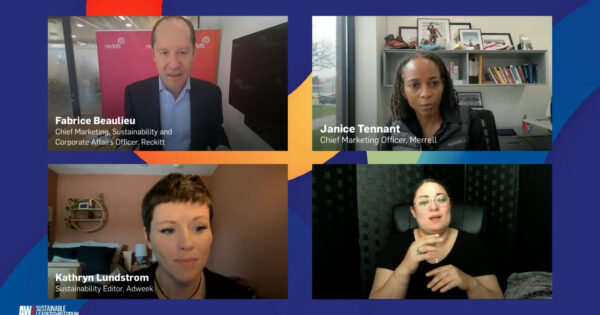
Learn to partner with creators and build customer trust with authenticity. Join leaders from TikTok, the NBA and more at Social Media Week, May 16–18. Register now.
Recessionary pressures are squeezing brand budgets. As a result, marketers have to make tough decisions to fulfill sustainability-related commitments and reach emissions-reduction goals this year. Chief marketers from Reckitt and Merrell joined Adweek’s sustainability editor Kathryn Lundstrom to talk about how they’re working alongside their sustainability counterparts to keep climate issues top of mind in 2023.
The heart of the brand playbook
Fabrice Beaulieu, Reckitt’s chief marketing, sustainability, and corporate affairs officer, shared his perspective on the evolving expectations of consumers and the role of sustainability in driving growth for consumer goods companies.
I think sometimes we can start to feel paralyzed by the size of the challenge.
Janice Tennant, CMO, Merrell
“We always start with what people want as marketers — we exist to serve people’s needs and meet their expectations,” he explained.
“When it comes to sustainability, people’s expectations have been growing rapidly. To put it simply, they want two things from us: more sustainable products and brands that contribute positively to society — brands that step up and do something positive. You can achieve this through innovation and communication, two major drivers of growth for consumer goods companies.”
Overcoming challenges and fostering progress
In an era marked by a challenging economic landscape and tightening budgets, it’s vital for brands to remain committed to their sustainability goals and not let these challenges overshadow their efforts. Janice Tennant, Merrell’s chief marketing officer, highlighted the importance of not being afraid to take the first small steps to spur your sustainability journey.
“This is a big undertaking that we’re all trying to do — no matter what industry or space you’re in,” she said. “I think sometimes we can start to feel paralyzed by the size of the challenge. At Merrell, we talk about the importance of just chipping away, one step at a time.”
She urged brands to recognize there’s no easy solution or one-size-fits-all approach to sustainability.
“We recognize and embrace the fact that we’re going to be failing along the way,” she said. “But as long as we have our eye on that future commitment we’re making, and we’re making progress toward it — not necessarily perfection — that’s what matters.”
Meeting consumers where they are
Beaulieu agreed that even though consumers today are increasingly conscious of the impact their purchases have on the environment, they don’t want to make trade-offs between sustainability and performance. He said that taking small steps toward sustainability has another benefit for brands, allowing them to provide consumers with a seamless experience.
“For example, if you sell dishwashing tablets in a bag and that bag moves from plastic to mostly paper and a little bit of plastic, and nothing else changes, that’s seamless, and that’s something that people will welcome,” he explained. “But if you entirely change the packaging and it’s much harder to open and more complicated to use, that’s a big trade-off. Consumers are not going to feel positive about that.”

